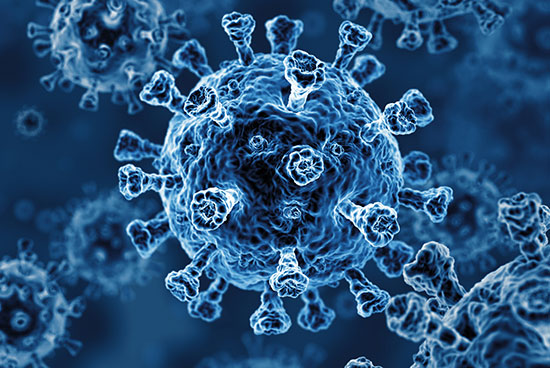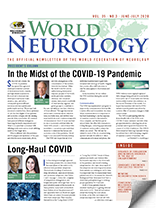By Avindra Nath and B. Jeanne Billioux

By Avindra Nath and B. Jeanne Billioux
It is becoming increasingly apparent that many patients who recovered from the acute phase of the SARS-CoV-2 infection have persistent symptoms. This includes clouding of mentation, sleep disturbances, exercise intolerance, and autonomic symptoms. (See Tables 1 and 2 below) Some also complain of temperature dysregulation and lymphadenopathy. Although there are no peer-reviewed papers at the moment on these patients, many news articles have been written about this phenomenon1-4 and apparently there are Facebook pages where there are several thousand patients with these symptoms. They describe themselves as the “Long-Haul-COVID” or “Long-Tail COVID.” Many of these patients are health care workers who had massive exposure to the virus early in the pandemic and describe having symptoms for 100+ days. Since many of the symptoms are neurological in nature, these patients are seeking us out for help. It is important that we characterize these patients and try to document the objective findings and then determine how best to study their pathophysiology to develop proper guidelines for treatment.

Most of these patients were in excellent health prior to getting infected with SARS-CoV-2. They all had myriad symptoms during the acute phase; however, as the fever and respiratory symptoms improved, they are left with persistent systemic symptoms, some of which are gradually improving, but not all are following that course. While some were admitted to the hospital due to pulmonary symptoms, the majority were isolated at home. Many of these symptoms overlap with those of patients with myalgic encephalomyelitis/chronic fatigue syndrome (ME/CFS). The cause of ME/CFS remains unknown despite decades of research of the syndrome. Many of these patients similarly report a viral infection as a trigger, but since they come to our attention months and years after symptom onset, it is impossible to know what may have triggered the symptoms.
Symptoms of Long-Haul COVID
- Insomnia or frequent awakenings
- Inability to concentrate
- and think clearly
- Easy fatiguability despite normal lung function
- Anorexia or increased appetite
- Temperature dysregulation
- Lymphadenopathy
- Dysautonomia
Table 1. Symptoms.
Long-Haul COVID thus represents an excellent opportunity to study the pathophysiology of ME/CFS that may have broader implications. It is unclear at present if these patients may have endocrine abnormalities, but certainly with SARS-CoV-1, hypothalamic/pituitary dysfunction and adrenal insufficiency has been reported5. It would, of course, be equally important to determine if there might be any premorbid conditions or medications that might contribute to these symptoms.
Autonomic symptoms in Long-Haul COVID
- Tachycardia upon mild exercise or standing
- Night sweats
- Gastroparesis
- Constipation
- Peripheral vasoconstriction
Table 2. Autonomic symptoms.
Even at this early stage, it might be important to determine what the potential pathophysiological mechanisms might be. So far there is no convincing evidence for widespread infection of the brain with the virus. The virus has been detected in CSF and the brain in very rare cases; however, there is evidence for widespread glial cell activation that may be related to metabolic dysfunction or to the massive immune activation in the periphery. Other possibilities are specific immune responses targeted against specific regions of the brain and autonomic nervous system. Depending on the predominant underlying pathophysiological mechanism at play, targeted treatment might be possible.
Unfortunately, it looks like the pandemic has gotten out of control. It is spreading rapidly across the globe, and even if we have an effective vaccine, we might never have enough dosages to vaccinate the eight billion inhabitants on this planet. And we also have a subset of the population that is opposed to any kind of vaccination. So COVID-19 is here for the long haul, and neurologists are going to play a critical role in the management of these “Long-Haulers.” Several efforts are underway to prospectively follow these patients with persistent symptoms, including studies at the intramural program at the United States National Institutes of Health in Bethesda, Maryland. Hopefully we can get to the bottom of these manifestations soon and find solace for these patients in a timely manner. •
Avindra Nath, MD, is chief of the Section of Infections of the Nervous System and Clinical Director, National Institute of Neurological Disorders and Stroke (NINDS), National Institutes of Health in Bethesda, Maryland.
Jeanne Billioux, MD, is staff clinician and head of the program in International Neuroinfectious Diseases within NINDS. Her research focus is on emerging infectious diseases and conducting research on the neurological consequences of infections in an International setting.
References:
- https://www.wsj.com/articles/three-months-in-these-patients-are-still-ravaged-by-covids-fallout-11593612004
- https://www.washingtonpost.com/health/could-covid-19-cause-long-term-chronic-fatigue-and-illness-in-some-patients/2020/05/29/bcd5edb2-a02c-11ea-b5c9-570a91917d8d_story.html
- https://www.bloomberg.com/news/videos/2020-06-10/the-lingering-symptoms-of-covid-19-video
- https://www.washingtonpost.com/health/2020/06/11/coronavirus-chronic/?arc404=true
- Leow MK-S, Kwek DS-K, Ng AW-K, Ong K-C, Kaw GJ-L, Lee LS-U. Hypocortisolism in survivors of severe acute respiratory syndrome (SARS). Clin Endocrinol. 2005;63(2):197-202.
